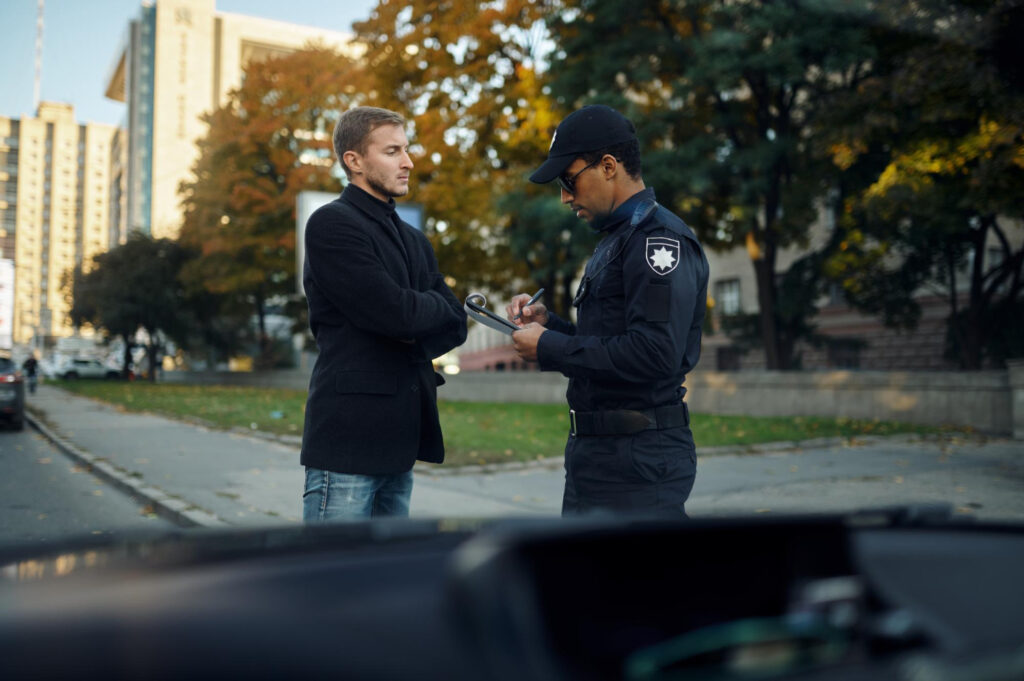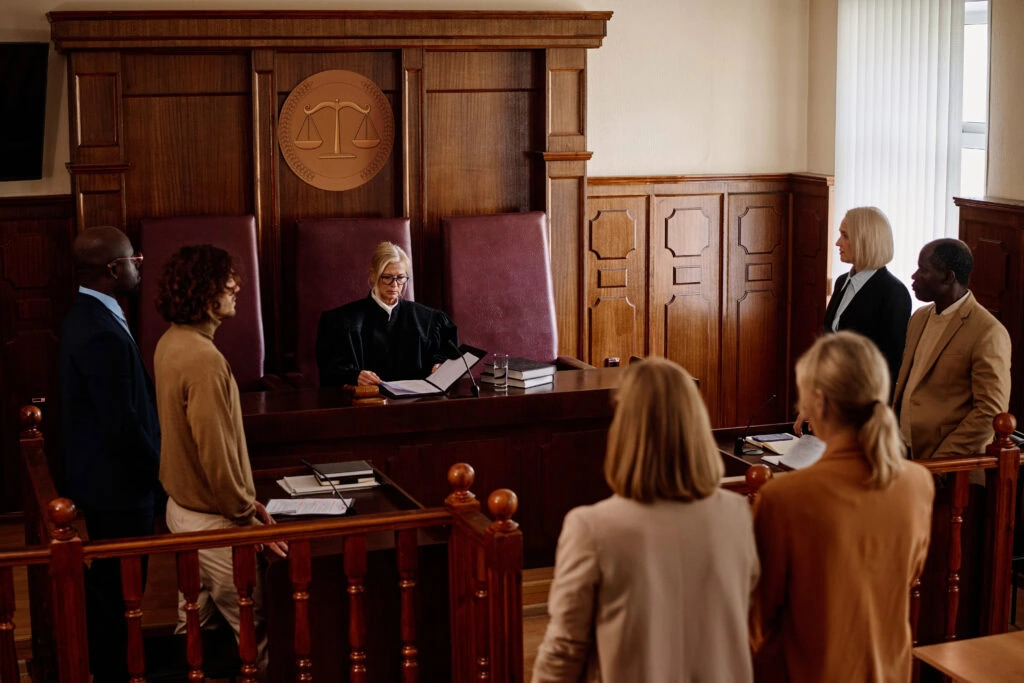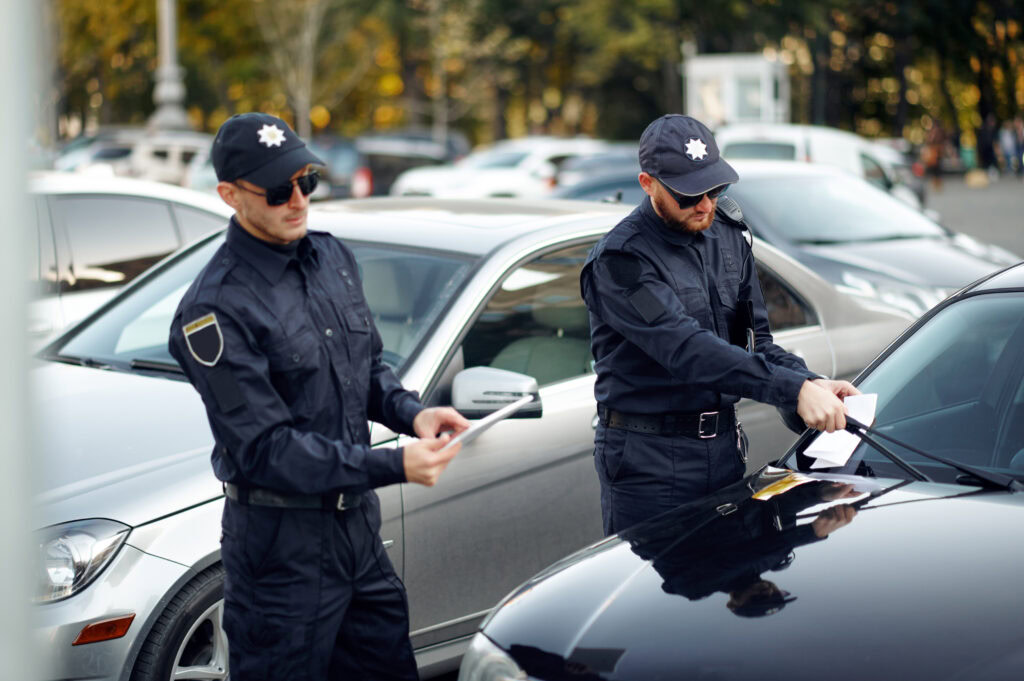Being stopped by the police can feel incredibly intimidating, even when you know you’ve done nothing wrong. We’ve all been in a situation where we wished we knew more about our rights during these encounters, especially after an increase of over 10% in recorded stop-and-search incidents last year alone.
This blog post is designed to help clarify the legal rights and responsibilities that apply when interacting with law enforcement, whether on foot, in your car, or even when they knock on your door at home. These include rights police don’t want you to know.
It’s crucial information every citizen should be armed with. Ready to dive in?
Your Rights When Stopped by the Police
When stopped by the police, it is important to know your rights: the right to remain silent, the right to refuse consent to a search, and the right to ask if you are free to leave or under arrest.
– Right to Remain Silent
Knowing and understanding your legal rights is vital, and the right to remain silent tops the list. This constitutional protection allows you to refuse to answer any questions from law enforcement during an encounter or interrogation without fear of punishment.
Whether stopped on the street, pulled over in your car, or approached at home by police officers, asserting this right can protect you from self-incrimination. To exercise this right effectively, inform law enforcement that you choose not to speak until a lawyer is present.
– Right To Refuse Consent to a Search
Top on the list of rights police don’t want you to know is the right to refuse consent to a search. We can deny consent to a search when law enforcement officials stop us. This right is vital and stems directly from our Fourth Amendment, which protects us against unreasonable searches and seizures by the police.
In most instances, an officer must possess a valid warrant or probable cause to conduct a legal search without your consent.
However, we must understand how to express this refusal properly. Politely, but declining any request for a search can decrease potential conflicts with officers.
Just thinking about it isn’t enough; you must voice your denial loud and clear because consent is often interpreted through actions and words. Always remain calm and composed during these encounters with law enforcement, respecting their role while protecting your rights.
– Right To Ask if You Are Free To Leave or Under Arrest
Interactions with law enforcement can be daunting. Knowing that you have the right to ask if you are free to leave or under arrest is essential. This question delineates the lines between a simple stop, detention, and an actual arrest.
Furthermore, during any police interaction, your demeanor can significantly influence the encounter’s direction. Displaying hostility or aggressive behaviors can escalate situations unnecessarily. While asserting your rights is vital, it’s equally important to ensure your tone is respectful and your actions non-threatening. This balance aids in keeping the interaction peaceful and preventing potential legal complications.
If confronted by a police officer, calmly asking if you’re under arrest or free to go helps clarify your situation instantly. Remember that there’s no harm in exercising this right; it could mean the difference between walking away from an uncomfortable scenario or ending up at a police station trying to understand what just happened.
Protecting your rights during interactions with law enforcement is crucial for maintaining your independence and personal safety. Moreover, knowing your legal rights when stopped by the police ensures you don’t unknowingly waive any of them out of fear or confusion.
Your Responsibilities When Stopped by the Police
Provide your name and basic identifying information, follow lawful orders or requests, and cooperate without self-incrimination.
– Provide Your Name and Basic Identifying Information
When stopped by the police, providing your name and basic identifying information is important. This includes your full name, date of birth, and address. Providing this information is a requirement in most jurisdictions, and failure to do so may result in further legal complications.
Keep in mind that you are only obligated to give this information and not answer any additional questions without the presence of a lawyer. It’s crucial to know your rights and strike a balance between cooperation and protecting yourself during interactions with law enforcement officers.
– Follow Lawful Orders or Requests
We must remember to follow lawful orders or requests from law enforcement officers during encounters. It is important to cooperate and comply with their instructions without hesitation.
This includes providing the necessary information, such as our name and basic identifying details when asked. Following these lawful orders can help ensure a smooth interaction with the police while maintaining our rights and responsibilities.
In any encounter with law enforcement, it’s crucial to act respectfully and calmly to protect ourselves and navigate the situation effectively.
– Cooperate Without Self-Incrimination
We understand that being stopped by the police can be a stressful situation. However, it’s important to remember that you have a right to remain silent and not incriminate yourself.
While protecting your rights is crucial, it’s also beneficial to establish clear and open communication with law enforcement officers. If unsure about a request or instruction, kindly ask for clarification rather than outright refusing or reacting negatively. This openness helps maintain a sense of mutual respect during the encounter and can mitigate potential misunderstandings.
When interacting with law enforcement officers, it is crucial to cooperate without providing any self-incriminating information or statements. By exercising your right to remain silent, you protect yourself from potential harm and ensure you don’t inadvertently say something that could be used against you later.
Staying calm and respectful during these encounters while still asserting your rights is essential.
Your Rights When Stopped in Your Car
When stopped in your car, you must know your rights: the right to remain in your vehicle, refuse consent to a search without a warrant, and ask why you were pulled over.
– Right To Remain in Your Vehicle
When stopped by the police while driving, it is important to know your rights. One of these rights is the right to remain in your vehicle. This means that unless instructed otherwise by law enforcement, you have the right to stay inside your car during a traffic stop.
You only need to exit the vehicle if specifically asked. Exercising this right can help ensure your safety and maintain control over the situation. If you have any concerns or questions about your rights during a police encounter, it’s always a good idea to consult a lawyer for guidance and support.
– Right To Refuse Consent to a Search Without a Warrant
We have the right to say no if the police ask to search us or our belongings without a warrant. This means we can protect our privacy and prevent unwanted intrusion by law enforcement.
It’s important to remember that the police need probable cause or a valid warrant to search, so we should always exercise this right and not feel pressured into consenting.
By refusing consent, we assert our Fourth Amendment rights and ensure our personal space remains protected.
– Right To Ask for the Reason for Being Pulled Over
We have the right to ask law enforcement officers why we are being pulled over. It is important to understand the reason for the stop, as it helps us know if our rights are being respected and if there is a legitimate basis for the interaction.
Your Rights When Law Enforcement Comes to Your Home
When law enforcement comes to your home, you have the right not to let them enter without a warrant and can ask for the purpose of their visit. You also have the right to remain silent and ask for a lawyer if needed.
– Right To Not Let Law Enforcement Enter Without a Warrant
We have the right to refuse entry to law enforcement officers without a warrant. This means that if the police come to our home, they can only enter if they have a valid search warrant or if there are exigent circumstances.
Knowing and exercising this right is important to protect our privacy and ensure law enforcement respects proper legal procedures. If the police do not have a warrant, we can politely but firmly assert our rights by informing them that we do not consent to their entry without one.
– Right To Ask for the Purpose of Their Visit
We have the right to ask law enforcement officers for the purpose of their visit when they come to our homes. This helps us understand why they are there and ensures our rights are respected.
It’s important to remember that we can exercise our right to remain silent and ask for a lawyer if we feel uncomfortable or unsure about the situation. By asking for their visit, we assert our authority as homeowners and protect ourselves from potential violations of our rights during interactions with law enforcement.
– Right To Remain Silent and Ask for a Lawyer
If the police stop you, remember you can remain silent and ask for a lawyer. This means you do not have to answer any questions from law enforcement officers, even if they pressure or try to intimidate you.
You can say, “I choose to remain silent.” Additionally, if the police start asking you questions about a crime, it is important to exercise your right to consult with an attorney before answering.
An experienced lawyer can provide guidance and help protect your rights throughout the process.
What To Do if Your Rights Are Violated
If you believe that your rights have been violated during a police encounter, it’s important to know what steps you can take. First and foremost, stay calm and try to remember as many details about the incident as possible.
It may also be helpful to reach out to organizations like the ACLU (American Civil Liberties Union) for additional support and resources.
In addition to seeking legal counsel, documenting everything related to the incident is crucial. Write down a detailed account of what happened while it is still fresh in your memory. By taking these steps and seeking professional guidance when needed, you assert your rights and hold those responsible accountable for their actions.
Conclusion
In conclusion, it is crucial to know your rights when stopped by the police. Understanding your rights and responsibilities can help protect you during interactions with law enforcement.
If you ever find yourself in a situation where your rights are violated, it is important to seek legal assistance immediately. Remember, knowledge is power—ensure you can assert your rights effectively for a safe and fair encounter with the police.
Contact David L. Faulkner for Help Today!
If you find yourself in a situation where your rights have been violated or need legal advice regarding encounters with law enforcement (such as rights police don’t want you to know), don’t hesitate to contact us. We are here to help and provide guidance.
Our experienced team, led by David L. Faulkner, is well-versed in the laws surrounding police interactions and can assist you in protecting your rights. Contact David L. Faulkner for help today!










